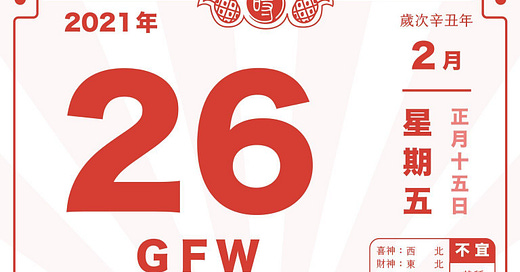CDT Weekly, February 19-26
Sensitive Words Calendar, Taiwanese pineapple, Wuhan memories, online speech punished, and CDT on Clubhouse
Welcome to the third edition of CDT’s weekly email newsletter. With these updates, we aim to provide an overview of new content across CDT’s English and Chinese sites, as well as the bilingual China Digital Space wiki, and related content elsewhere.
CDT Chinese launched its new “Sensitive Words Calendar” on Friday, choosing as its inaugural entry the site’s nemesis, the “Great Firewall.” The calendar will offer a daily selection of terms related to censorship, political hotspots, and other issues within the scope of CDT’s work. Its design, including its pineapple motif, is inspired by Taiwanese farming calendars. By chance, the launch coincided with China’s announcement of a ban on Taiwanese pineapple, an important and iconic cash crop. Taiwanese officials have denounced the ban as “economic intimidation,” and challenged Beijing’s claims that pests had stowed away in recent shipments. The fruit is in good company with Australian wine on China’s ever-evolving list of foodstuffs non grata.
This week, CDT English translated a poem originally shared on Weibo last April, which comprised a series of vignettes of life and death under lockdown in Wuhan in the early weeks of the COVID-19 pandemic. The poem’s terse, single-sentence stories are anonymized and presented with equal emphasis. The poem contextualizes the more prominent cases and amplifies the lesser known ones by intermingling the two: “The one who wrote ‘I can, I understand,’ signed with a red fingerprint, and then died twice” (Dr Li Wenliang) and “The one who said, ‘If I had seen this day coming, I would have said it everywhere, criticism or no’” (Dr Ai Fen) appear alongside “The one who starved to death in their home during quarantine,” “The one with no doctors to turn to, who feared infecting his wife and kids and so jumped from a bridge to end his life,” and “The one who went alone to the Civil Affairs Bureau to report their orphan status after their entire family died.” The poem was extremely widely shared last year as an expression both of grief at the unfolding tragedy, and of defiant anger at the censorship surrounding it.
The poem’s author, Zhang Wenfang or “Marilyn Monroe,” was detained soon after it appeared. CDT’s translation this week was prompted by the news on February 22 that she had been sentenced to six months in prison for “picking quarrels and provoking trouble.” CDT Chinese compiled online reactions to the news, including surprise at the severity of the punishment, sympathy with the author, and determination to preserve “incorrect collective memory” in the face of the aggressively enforced triumphalist orthodoxy. One pair of comments, by “Pfauinsel,” offered a rose emoji to “this brave woman,” and urged: “Remember, and tell your descendants. Don’t let memory be erased by force: individual memories have their own power and significance, which transcend time and any fleeting authority.” (Other official attempts to enforce “correct collective memory” were documented in CDT’s Minitrue Diary series of leaked media directives from the early weeks of the outbreak.)
Zhang’s is one of a growing number of prosecutions and punishments for online speech. According to other recent reports, six people have been arrested for online posts questioning official accounts of clashes between Chinese and Indian troops in the Galwan valley, while a seventh living overseas is subject to the enigmatic measure of “online pursuit.” At least one of those detained faces the same charge of “picking quarrels and provoking trouble” as Zhang, while others face prosecution under a 2018 law against “insulting or slandering heroes and martyrs,” part of a broader push to defend the Party’s monopoly on Chinese history and to crack down on “historical nihilist” alternative accounts and interpretations. The author of CDT Chinese’s weekly roundup on Monday commented: “In short, the very clear trend is this: it was already hard for Chinese people to utter a word at odds with the official line, no matter how slightly, and the room for speech is being cut back even more severely.”
Another example of the still tightening online environment is the unexpected blocking last week of independent music site Bandcamp, which had offered many Chinese acts a vital bridge to peers and audiences elsewhere. Together with a recent crackdown on volunteer film and TV subtitling groups and the more predictable blocking of Clubhouse, the Bandcamp incident illustrates the ongoing constriction of space for unregulated international exchanges.
On Saturday, CDT Chinese will host a Clubhouse Q&A with UCLA’s Michael Berry to discuss his English translation of Fang Fang’s Wuhan Diary, probably the most prominent and controversial inside account of the Wuhan lockdown. News that it would be translated and published abroad helped fuel an intense backlash last spring, with Fang Fang herself subjected to intense online harassment, and some of her supporters also coming under attack. Berry previously spoke to CDT in 2016 about the growing entanglement between Hollywood and China which, as shown in a PEN America report last August, has only deepened since. For those unable to attend the Clubhouse session, Berry previously discussed his work on Wuhan Diary on the Sinica Podcast last July. (Please note that questions remain over Clubhouse’s safety for users within China involved in sensitive discussions.)
Elsewhere on the news front, CDT English rounded up coverage of:
… further moves in Hong Kong to neutralize pro-democracy opposition, with the looming introduction of a loyalty oath and a wide range of targeted disqualifying criteria for district councillors.
… the Canadian parliament’s vote to label the situation in Xinjiang as “genocide,” and recent arguments for the term’s applicability.
… digital currency and surveillance, and recent reports on foreign entanglement with China’s surveillance industry.
… unsubstantiated suspicions in Myanmar that China was behind the country’s recent coup, and the event’s implications for the PRC more broadly.





